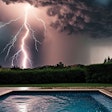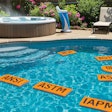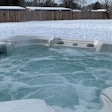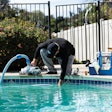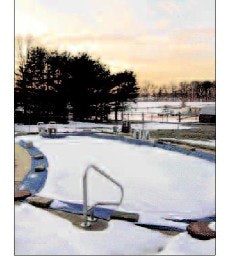
As September nears, thoughts turn from summer's lazy, hazy days to Labor Day picnics, back-to-school sales and fall foliage. For pool pros in northern regions, images of snow-laden pool covers also creep into the consciousness, in spite of the still-warm weather.
This foresight is something of a mixed blessing. While it mutes one's enjoyment of the latter part of the summertime, it also allows dealers and service professionals to get a jump on what is one of their busiest times of the year.
Early Warnings
Because calls for closings rise in inverse relation to the temperature, many service pros realize that simply waiting for the phone to ring would lead to a glut of customers wanting their pools closed, say, on the last Saturday in September. To prevent an avalanche of appointment-making, they'll gently try to remind their customers — most of whom are not yet burdened with grim thoughts of freezing temperatures — that it's never too early to start thinking about pool closing. Well, it's almost never too early.
"We don't like to make a lot of noise until the end of August, because we don't want to bum people out," says Rob Anderson, president of Poolside, an AQUA 100 company in St. Paul, Minn. "We do a direct mail in early September around Labor Day. It's loaded with specials on winterizing, and has some tips for people that want to do it themselves."
The company also tries to get its outdoor commercial accounts, which typically close before the residential ones, out of the way early.
"A lot of residential customers want to wait around for some decent weather in September, which isn't unusual around here," Anderson says. "The hard-core lap swimmers will wait until the end of October. Early November is for the procrastinators and forgetters. That's when we'll bring the thawing equipment."
In Hamburg, N.Y., just down the Interstate from Buffalo, the area's hardy residents are accustomed to early snow and cold, but they, too, often thumb their noses at the threat of winter and keep their pools open late into the year.
"Most people want them open into October, but we'll continue closing right into the beginning of November," says Gail Rose, assistant field operations supervisor for Colley's Pools & Spas, a builder, retailer and service company in Hamburg. "Some customers will call to set up appointments in August, but most call us right after Labor Day."
Marketing the winterizing service is hardly necessary for the 42-year-old AQUA 100 company, which Rose estimates does about 800 closings annually. Its marketing efforts are limited to an on-hold message and Web site posting reminding customers to make an appointment.
"They mostly call us," she says. "We do the same people every year and they'll generally call to make an appointment. The ones that don't call, we'll just call them late in the season and close them when we're finished with the others."
Poolman of Wisconsin, a full-service builder and retailer in Eau Claire, also starts closings in October and continues into mid-November. Like Colley's, it relies largely on word-ofmouth, according to Wes Wiedenbeck, president. Of course, when customers hear horror stories about what can go wrong if a pool's not properly closed, there's not much need for a hard sell.
"A lot of people up here want a professional to do it for liability purposes," Wiedenbeck says. "They want to make sure the pipes don't burst and the like."
Ken Stockley, president of Pool & Patio Center in Coventry, R.I., says his company closes between 250 and 350 pools a year, but with a customer base of more than 7,000, he sees room for growth.
In an effort to increase the number of closings and to spread out the workload of the company's regular closings, he sends a postcard mailing to customers in July.
"It's to make them aware that they should contact us ASAP, because we fill up quickly on dates," he says.
Planning Ahead
While service techs are busy blowing out plumbing lines, draining filter tanks and pumps, covering skimmers or lowering the water level, removing jet fittings and fitting the covers, it's likely they'll find parts that are in need of repair. Rather than notifying the customer and scheduling another call immediately, most service companies simply wait until the pool is uncovered in the spring before doing the work. This choice is motivated by both time constraint and customer tendencies, according to Rose.
"If we discover a problem with something in the fall, the customer will usually tell us to wait until spring to fix it," she says. "That's why openings are a lot more hectic than closings, even though fewer people have us open their pools."
In fact, closings are a good time to check out equipment and make recommendations — and appointments — for the spring. That's Wiedenbeck's philosophy.
"We can point out potential areas of concern such as leaky pump seals, plumbing that's getting old and brittle, filter tanks and bodies showing signs of leakage, and potentially liners that need to be replaced," he says. "It's a way we make additional money.
"Since most people don't want to put any money into their pools until they have to, we'll put the work on the books for spring. It's a way to preschedule an opening in the spring, too."
House Calls
Depending on the dealer, the basics of a closing usually include blowing out the lines so there's no water to freeze, then adding winterizing chemicals and algaecide and putting on the winter cover. For the most part, dealers rely on the homeowners to keep their pools clean and balanced throughout the summer and trust they'll be ready to treat and cover when the time comes to close. After all, who's got time for chemical treatments and algae removal when there are hundreds of other customers waiting to have their pools closed?
"We educate them in the summer about pool maintenance, then when we send the mailing in September we'll suggest they bring in a sample a week before their scheduled closing so it can be in good shape before it's put to bed," says Anderson, whose company closes about 1,000 pools per year, the majority of which aren't serviced weekly. "We'll add some winterizing algaecide, but if they don't properly prepare it ahead of time, they'll be in for a surprise in the spring."
Pool & Patio Center does some cleaning the day of the closing, but, like most, it relies on the homeowner to have it done ahead of time.
"We'll go into the backyard and do a 10-15 minute 'finish vacuum' to clean up the pool a little, then blow out all their lines and the filter on an inground and add antifreeze to all the underground pipelines and the filtration system," Stockley explains.
For customers who haven't properly prepared for the closing, simply note the condition of the pool on the work order and adjust the cost of the closing accordingly, Rose suggests.
D.I.Y.
As is the case with weekly maintenance over the summer, the majority of customers in most areas will choose to winterize their own pools. For some, that means closely following your instructions and doing a satisfactory job, while for others it might mean a hurry-up job after the first frost warning. The latter customers usually end up with unpleasant surprises — sometimes disastrous ones.
"We'll open a few pools in the spring that are a real mess — both the water and the equipment," says Wiedenbeck. "If a line bursts we'll have to pressure check to isolate the blown lines, go in and dig up the concrete and usually run a whole new plumbing line."
Those do-it-yourselfers aren't likely to make the same mistakes again, and are usually swayed by Wiedenbeck's gentle sales pitch.
"We'll be as tactful as possible and say, 'Did you know that we have a service that could have helped you avoid this problem?'"
For the most part, though, customers who close their own pools don't have huge problems because they listen to the advice of their trusted dealers, the majority of which offer lots of information for homeowners who like to take care of their own pools.
"We do offer advice for the ones that don't already know how to do it," says Stockley. "New customers we give a lot of advice to hopefully avoid big problems. But not everybody reads that stuff, and that's when the problems occur."
Winter And Workers
After a busy summer and fall of selling, installing, servicing and shutting down pools, many companies find themselves with more workers than work once winter hits.
"We can't keep them all around," says Rob Anderson, president of Poolside in St. Paul, Minn. "The spa specialists work on spas all year-round, and our best guys do some of the indoor service work." The rest, however, are laid off with the hope that they'll return in the spring. Anderson says he feels "luckier than most" in that many do come back.
At Pool & Patio Center in Coventry, R.I., Ken Stockley, president, says a lot of the seasonal workers actually look forward to being laid off and most of the service staff returns when springtime rolls around.
"They collect unemployment and it gives them a break from the chaotic summer they just went through and gives them a chance to regroup," he says. "This year the only ones that didn't come back were individuals that we didn't want back anyway."
Gail Rose, assistant field operations supervisor for Colley's Pools & Spas in Hamburg, N.Y., also says her company is fortunate in that many laid off workers return in the spring. That's important, she says, because of the time and money Colley's invests in getting them trained.
"Some of the assistant service techs come and go, but we're lucky that a good number of them come back. One of our guys has been doing it for 18 years."
Not all companies have to lay workers off, though. Poolman of Wisconsin, for example, does a lot of indoor commercial work year-round. Still, that's not enough to keep all of them busy.
"We have them install fireplaces and hot tubs, and we're able to keep them busy throughout the winter," says Wes Wiedenbeck, president of the Eau Claire company.
—B.K.





































